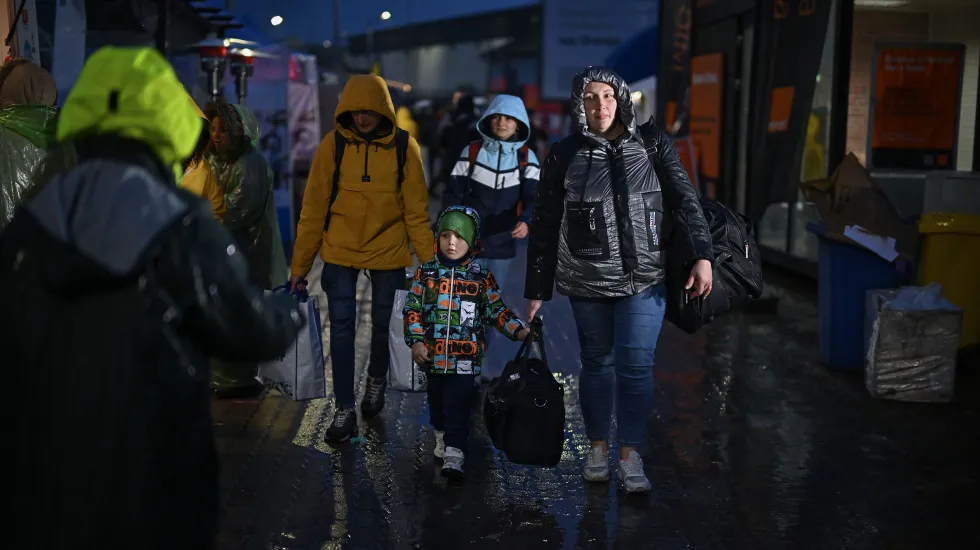
“Many in Mideast see hypocrisy in Western embrace of Ukraine,” read an Associated Press headline this week. Salon asked: “Whose lives really matter?” and answered its own question in the next breath — “How racism colors coverage of the crisis in Ukraine.”
On social media, a tweet by Ayo Sogunro, a Nigerian human rights lawyer, has been shared tens of thousands of times: “Can’t get it out of my head that Europe cried about a ‘migrant crisis’ in 2015 against 1.4m refugees fleeing war in Syria and yet quickly absorbed some 2m Ukrainians within days, complete with flags and piano music. Europe never had a migrant crisis. It has a racism crisis.”
Columnists
In-depth political coverage, sports analysis, entertainment reviews and cultural commentary.
I beg to differ. In fact, Americans and Europeans have expended quite a lot of blood and treasure over the past several decades to defend or help non-whites and non-Christians. The most directly analogous case to Russia’s invasion of Ukraine was Iraq’s 1990 invasion of Kuwait. The coverage of Kuwait’s suffering at the time was heart-rending, including stories about hospitals being plundered and civilians imprisoned, raped and tortured. Far from countenancing this assault, the U.S. assembled an international coalition of 35 nations to drive Iraq out of Kuwait in what became the First Gulf War.
In 1992 and 1993, a civil war had devastated Somalia. A United Nations relief operation had run aground. President George H.W. Bush offered to send 25,000 U.S. troops to keep order so that humanitarian aid could be distributed. What followed under the Clinton administration was the infamous “Black Hawk Down” episode in which 19 Americans were killed and 70 injured by al-Qaida-trained militants.
The U.S. took military action on behalf of Muslims six times in the past 30 years — in Kuwait, Somalia, Bosnia, Kosovo, Afghanistan and Iraq, and participated (if only from behind) in the military operation that removed Libya’s Moammar Gadhafi from power when he seemed poised to destroy the city of Benghazi. So call it seven. Say what you will about the wisdom of the Iraq invasion (or the other interventions), there is no doubt that they were undertaken with the goal of freeing people from a dictator, not imposing one.
Those who make facile comparisons between our wars and the Russian invasion might want to reflect that no Ukrainians are mobbing the Russian embassy in hopes of visas and no Ukrainians are hanging onto Russian jets. You don’t have to agree that the Iraq War was good policy or the long occupation of Afghanistan a wise use of resources to concede that we tried awfully hard to help both countries.
As for the different treatment of Ukrainian versus Mideast refugees, let’s remember that Europe accepted more than 1 million refugees from Syria and the U.S. accepted several thousand, despite non-trivial fears that ISIS and al-Qaida elements might be among those asking for asylum. Arguably, the strain those immigrants placed on European societies led directly to the rise of far-right parties. And while we’re thinking of Syria, let’s not forget that Russia also intervened in the conflict — on the side of Bashar al-Assad, helping to reduce Aleppo and other cities to rubble and further immiserate that nation.
”Whose lives really matter?” asks Salon. Well, African lives do. That’s why the U.S., under George W. Bush’s presidency, launched the largest commitment by any nation to fight a disease in history. The fund has already spent $100 billion and saved an estimated 20 million lives that would have been lost to HIV/AIDS.
Opinion This Week
A weekly overview of opinions, analysis and commentary on issues affecting Chicago, Illinois and our nation by outside contributors, Sun-Times readers and the CST Editorial Board.
So what has triggered this rash of commentary about Ukraine proving the racism of the West? On the BBC, a former Ukrainian official confessed that “It’s very emotional for me because I see European people with blue eyes and blond hair ... being killed every day.” An Al Jazeera anchor said, “These are not obviously refugees trying to get away from areas in the Middle East.”
Those comments were stupid, but the reason I recited the history above is that you can’t write whole nations off for the stray remarks of a few. In fact, identification with those most like us — in appearance, culture, religion, nation, whatever — is part of human nature, and no one of any color is completely immune. Arabs are more concerned about Palestinians than about the Rohingya or Sudanese. That’s not racism, it’s just fellow feeling.
Europeans and Americans have responded to Ukraine’s plight with empathy, anger, admiration and love. And so have Kenyans and Japanese and Mexicans and Egyptians and billions more. We all have our tribal tendencies and must strive to recognize that all God’s children are of equal moral worth. But looking at our recent history, we’ve done pretty well on that score. So let’s not mar this moment of moral clarity with talk of racism.
Mona Charen is policy editor of The Bulwark and host of the “Beg to Differ” podcast.
Send letters to letters@suntimes.com







